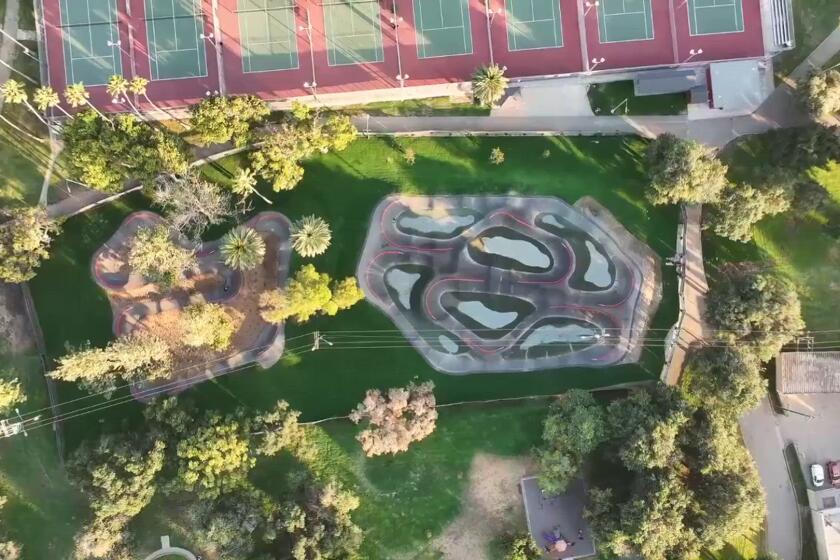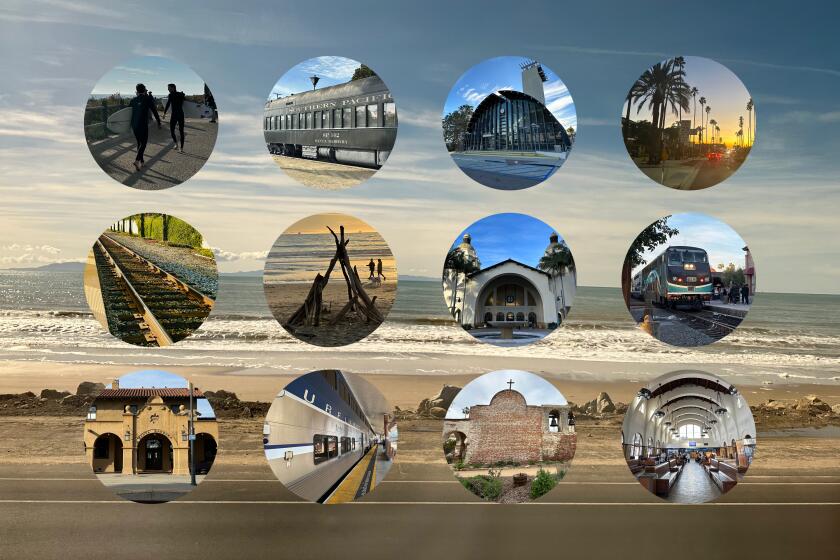Letters: Those rowdy Italian soccer fans
Those rowdy soccer fans
I enjoyed the articles on soccer cities [“For Kicks,” by April Orcutt, June 8]. My husband and I had an experience with soccer fans in Italy about 15 years ago. We were waiting for a train at a small station north of Milan. We were headed to Rovereto, a small town we had heard about from the L.A. Times Travel section.
A stationmaster came up to us and said we should move from that area because a train was coming from Milan full of rowdy soccer fans. We decided to stay because there was no place else to go.
The train pulled in a few minutes later, and we saw young men breaking windows and running wild on the train. Our train came in just then and we got on. We saw two nuns sitting in the other train just looking at their laps hoping no one would bother them.
Luckily, our train left very quickly, and we met some nice young people on it. They offered us their seats and were very polite, and we carried on a nice conversation with them. It’s strange how different they were from the soccer fans.
Ruth Monck
Whittier
Tips, then a tip
Regarding Bonnie Sloane’s June 8 letter about an “intrusive” Your Scene photograph: People playing in public squares are often there to make tips. If you take a photo, put a tip in his jar. He will open up right away. Another tip is to not photograph soldiers on patrol in public places. The photo shows their tactical setup and makes them feel vulnerable to kidnapping.
Mike Benbrook
El Cajon
Hike, don’t bike
Although an off-road motorbike may be a good way to see much of Death Valley, I believe Charles Fleming missed the mark on Titus Canyon [“Rev Up Off Beaten Path,” June 1].
Nowhere in the article does it mention the approximately two-mile hike starting on the western side about 2.6 miles off Scotty’s Castle Road. Walk the canyon for two miles and then retrace your steps.
This section is a slot canyon that is best enjoyed by hiking it, taking your time and stopping occasionally to view the rock canyons towering above.
I saw two chuckwallas along the way. Do this early in the day, though, at least by 9 a.m., so you can get back to the entrance before someone on an annoying motorbike comes zooming through.
Susan Hightower
Los Osos, Calif.
Sadly true
I was shocked and dismayed after reading Amanda Jones’ article on the Galápagos Islands [“Humans Imperil Wildlife,” June 1]. I was dismayed that people would come to this place and abuse the animals that make it unique. But I was also shocked that a journalist would recognize bad behavior and do nothing about it. I can understand the journalist’s credo that you are just an impartial observer, but she wasn’t writing a political exposé. Why wouldn’t she stop people from taunting seals (actually, sea lions), riding giant tortoises, poking at iguanas and chasing boobies? I spent a lot of time in April with two dedicated Galápagos guides. They were, indeed, polite, but they would not allow anyone to violate the park’s policy about protecting the animals.
James R. Lane
Los Angeles
Any joy I might receive in visiting the Galápagos Islands would be negated by my awareness that I was contributing to their destruction just by being there. Furthermore, why would anyone of good conscience want to spend good time and money to go some place where one is likely to witness the harassment of innocent animals just for the amusement of fellow tourists? I say stay away. Humans don’t always have to just because they can.
Leah Corry
Santa Monica
Jones’ depiction of Inle Lake in Myanmar was spot on [“Afloat in Tourism — Litter, Noise Too,” June 1], and the overall exploitation and pollution of the rest of the country is similar. Yangon is being overtaken by gaudy Chinese-funded “development,” and no attention is paid to municipal services. The plastic trash, open sewers at roadsides and choking tailpipe smoke are overwhelming.
Our lodging on Inle Lake was idyllic in appearance until we realized that the constant loud diesel boat engines and exhaust in the still, heavy air made it difficult to appreciate the bucolic scene.
About midnight, we awoke to heavy smoke in the room and went to the porch to find nearby sugar cane fields being burned off, which sent the smoke pouring over the hotel.
Taken together, the pace of destruction of the nearby dry monsoon forest, cleared for sugar cane, and the tourist hotels going up, the lake is being sucked dry and becoming filled with soil and fertilizer runoff.
With the political situation set up to give the elites who have always had access to power even easier access, the country is being plundered with impunity. It is tragic to see.
Susan Rudnicki
Manhattan Beach
More to Read
Sign up for The Wild
We’ll help you find the best places to hike, bike and run, as well as the perfect silent spots for meditation and yoga.
You may occasionally receive promotional content from the Los Angeles Times.






